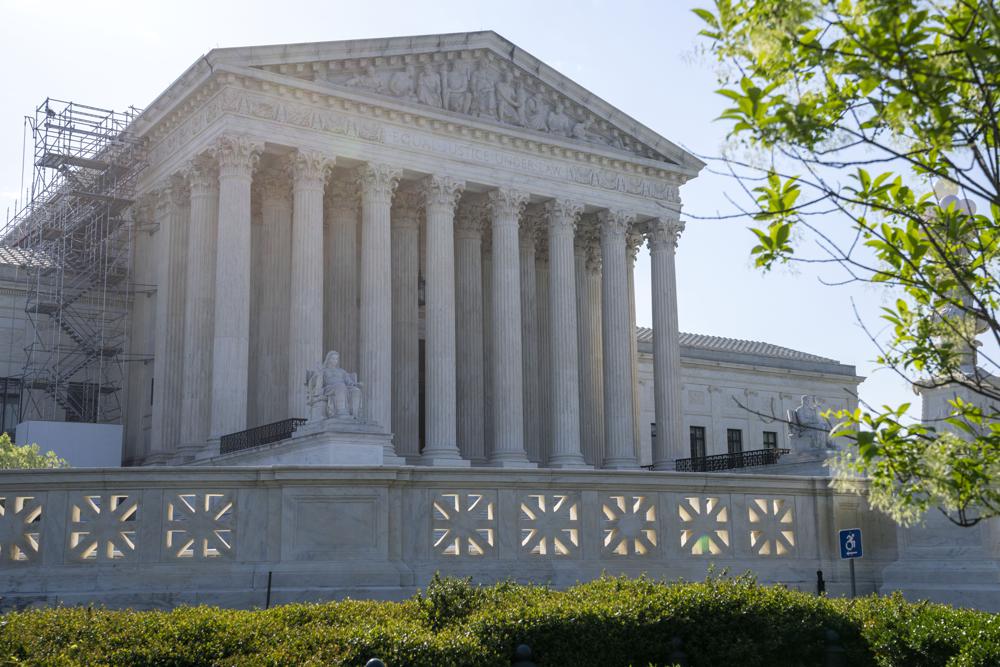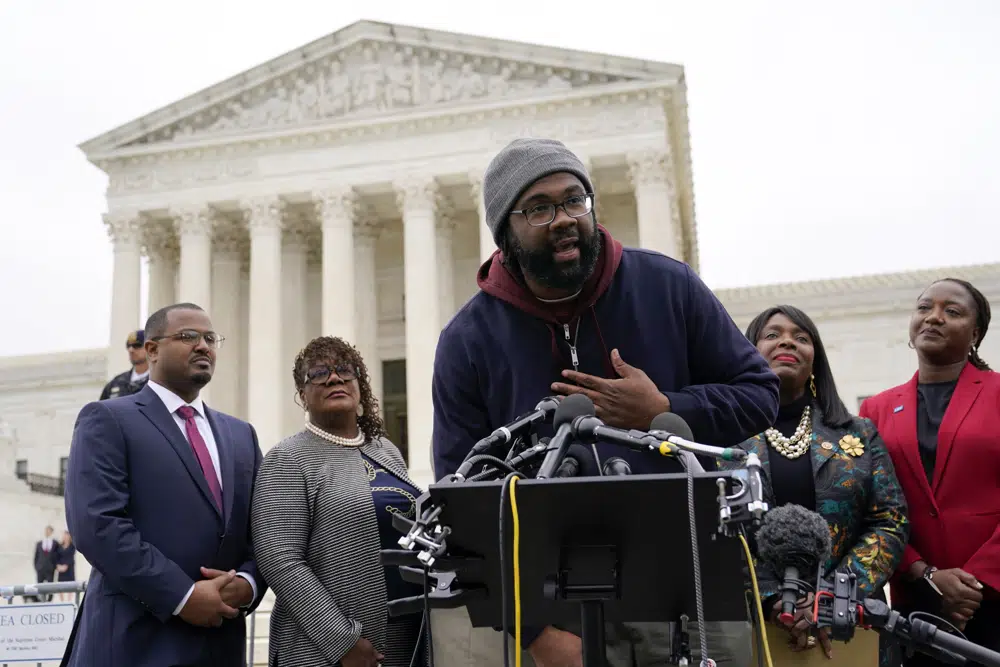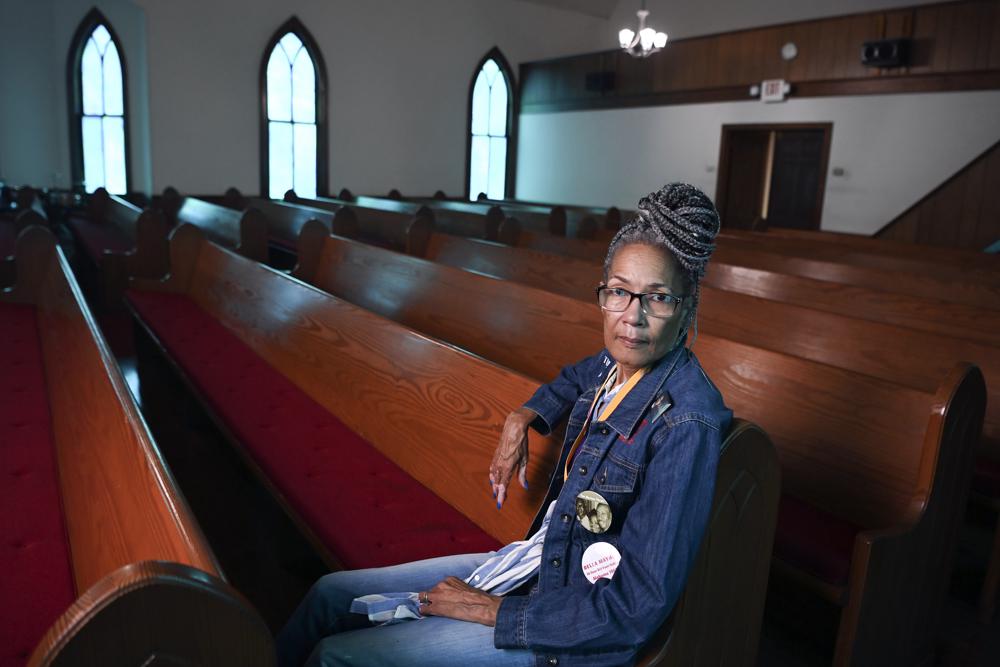Alabama delegation meets with Commander of Space Command

On Tuesday, the Alabama Congressional Delegation held a meeting today with General James H. Dickinson, Commander of the U.S. Space Command. “General Dickinson just confirmed to us that the headquarters of U.S. Space Command belongs on Redstone Arsenal in Huntsville, Alabama,” said U.S. Senator Katie Britt (R-Alabama). “This is no surprise, because it’s what the facts clearly support. The White House must keep politics out of this. It’s past time for them to do what’s best for our national security.” News media reports confirm that a U.S. Government Accountability Office report dated May 2022 stated, “Air Force analysis identified Redstone Arsenal as the highest scoring location in the Evaluation Phase, the highest ranked location in the Selection Phase, and the location with the most advantages in the decision matrix. Air Force officials, including the then Secretary of the Air Force, stated that the decision to identify Redstone Arsenal as the preferred location stemmed from Air Force analysis showing it was the strongest candidate location.” “The fact is, Air Force already made the correct decision well over two years ago,” said Congressman Mike Rogers (R-AL03). That decision was affirmed by the GAO and the DoD Inspector General over a year ago. This decision was based on multiple factors, and Redstone Arsenal in Huntsville, Alabama, was the clear winner in the Evaluation and Selection phase. I am deeply concerned that the continued delays in making this move final are politically motivated and damaging to our national security.” “[T]he January 2021 selection of Redstone Arsenal as the preferred location for U.S. Space Command headquarters was consistent with the Air Force’s analysis,” the GAO added. “Multiple senior officials we interviewed stated that they felt the process was unbiased, including the former Assistant Secretary of the Air Force for Installations, Environment and Energy; the former Secretary of the Air Force; the former Vice Chairman of the Joint Chiefs of Staff; the U.S. Space Command Combatant Commander; and the U.S. Space Force Chief of Space Operations.” Finally, per the GAO, “[T]he Air Force identified the ability to disperse combatant commands geographically as supporting its decision, and Air Force officials told us that they considered risk related to colocating U.S. Space Command and U.S. Northern Command at Peterson Air Force Base as a military judgment issue. The Air Force considered dispersing combatant commands in different geographic areas as a strategic advantage, and a way to avoid placing two combatant commands at risk from the same threat.” The Biden Administration, meanwhile, has delayed moving Space Command to Redstone Arsenal. This decision was made three years ago. Redstone was chosen over Nebraska, which finished number 2 in the evaluation process. San Antonio, Texas, was third. Colorado finished fourth, but according to an NBC News report, the White House is poised to overrule the Air Force on this purely for political reasons. Colorado voted for Joe Biden, while Alabama, Nebraska, and Texas did not. To connect with the author of this story or to comment, email brandonmreporter@gmail.com.
U.S. Supreme Court strikes down Alabama Congressional Districts

The U.S. Supreme Court, in a 5 to 4 ruling, has rejected Alabama’s Congressional District map in the case of Milligan versus Merrill. The Supreme Court ruled that the 2021 Congressional redistricting map drawn by the Alabama Legislature likely violates the Voting Rights Act by diluting the power of Black voters. Alabama is 27% Black, and they vote overwhelmingly Democratic, but Alabama has just one Black Democrat – Terri Sewell (D-AL07) in its congressional delegation. The six other districts are represented by White Republican men. A three-judge panel of Judges in the Eleventh Circuit Court of Appeals in Atlanta ruled in 2022 that the 2021 redistricting violated the Voting Rights Act. That order was, however, stayed by the Supreme Court until they could review the case themselves. The Court, in Thursday’s decision, ruled that the eleventh circuit was, in fact, correct. This sends the case back to them for review. Alabama Today spoke with former State Senator Jim McClendon, who chaired the Joint Committee on Redistricting, and State Representative Chris Pringle (R-Mobile). “That kind of surprised me,” McClendon said. “We went out of our way to follow every ruling and decision that was made when we made that map.” McClendon explained that while redrawing the districts will make it more likely that there will be two Black members of the Alabama congressional delegation, it does not make that certain and could even potentially jeopardize the one Black incumbent – Congresswoman Terri Sewell (D-AL07). “Terri Sewell is at risk,” McClendon said. “We gave her 55% (minority voters).” McClendon was doubtful that in the 2 to 5 district split, it would be possible to have that high of a minority participation. To get two majority-minority or at least two districts with a high minority influence will mean splitting Mobile County to put Prichard and the Black parts of Mobile into a district with the Black Belt and Montgomery. That second district will likely run from Tuscaloosa to Bessemer to Birmingham and could run as far north as Huntsville. “I am sure not sure who is going to draw them (the Legislature or the courts),” McClendon said of the new zoning maps. The three-judge panel had ordered the Legislature to redraw the maps and warned if the state didn’t, then the Court would. The state ignored the Court and instead pressed ahead with its appeal to the U.S. Supreme Court. The Supreme Court’s decision to stay the ruling meant that the 2022 election proceeded with that now-invalid congressional redistricting map. At least two of Alabama’s congressional incumbents will likely find themselves in the same district. If the three-judge panel allows the Legislature to do the Congressional redistricting, then there is likely to be a special session of the Alabama Legislature that will be needed sometime this fall. The plaintiffs presented two congressional redistricting maps to the Court. It is possible that the Court could simply order the state to adopt one of those two maps rather than preparing a fourth map. Whichever map ultimately is adopted, the 2024 congressional districts will not look much like the current districts. “There are a bunch of parasite lawyers” involved in redistricting litigation, McClendon said. “This will give them something to work on for two or three years.” Because Alabama lost the redistricting case, the state will have to pay for the legal fees of the plaintiffs’ lawyers. McClendon did not run for reelection in 2022, so he has been replaced as the Senate Chair on the redistricting committee by Sen. Steve Livingston (R-Scottsboro). Chief Justice John Roberts and Justice Brett Kavanaugh joined the Court’s three liberals in the majority. “As we explain below, we find Alabama’s new approach to §2 compelling neither in theory nor in practice. We accordingly decline to recast our §2 case law as Alabama requested,” Roberts wrote for the majority. Black Alabamians vote Democratic over 90% of the time, while Alabamians in recent elections vote Republican in excess of 80%. If those trends continue, the new redistricting will make two districts either lean Democrat or very competitive. The other five districts, however, will likely become much more White and likely even more conservative. To connect with the author of this story or to comment, email brandonmreporter@gmail.com.
Legislature passes legislation to allow law enforcement officers to make arrest for parole or probation violations

On Tuesday, the Alabama Legislature approved bipartisan legislation allowing law enforcement officers to arrest persons for parole or probation violations. Senate Bill 157 (SB157) is sponsored by State Senator Chris Elliott (R-Fairhope) and carried in the Alabama House of Representatives by House Public Safety and Homeland Security Committee Chairman Allen Treadaway (R-Morris). Rep. Treadaway is a retired Birmingham Deputy Chief of Police. “This allows for a law enforcement officer to arrest a parolee that is violating the terms of his parole,” Treadaway explained. “What this bill does is allow the law enforcement officer to make that arrest if he witnesses the parolee committing a parole violation.” Treadaway explained that under current law, only parole officers can arrest a felon for violating the conditions of their parole or probation. Ordinarily, the parole officer will authorize law enforcement to make the arrest. “When we find them violating the terms of parole, we have to notify the parole officer,” Treadaway explained. This legislation was modified in the State Senate to require law enforcement officers who arrest parolees to notify the Bureau of Pardons and Paroles after the law enforcement officer makes the arrest. “He has four hours to notify the Board of Pardons and Paroles that he has taken that action,” Treadaway said. Rep. Thomas Jackson (D-Thomasville) expressed his concerns that this has the potential for an officer to harass a parolee. “You are giving those people some wrong ideas,” Rep. Jackson said. “If his parole says that he can’t go near children, and he is attending children’s events and hanging around schools, don’t you want the law enforcement officer to make that arrest?” Treadaway replied. Jackson responded, “There could be a grudge against someone. You know how that happens.” “The intent is well and good, but this can cause collateral damage and unintended consequences,” Jackson said. SB157, as enrolled, would “Allow a law enforcement officer to arrest a parolee or probationer without a warrant in certain circumstances; to require the Board of Pardons and Paroles to send the Alabama State Law Enforcement Agency the conditions of parole for an individual released on parole; to require a court to provide to the Alabama State Law Enforcement Agency the conditions of probation for an individual released on probation; and to require the Alabama State Law Enforcement Agency to make the conditions of parole or probation available to law enforcement officers and other authorized persons through the Law Enforcement Tactical System.” The House of Representatives passed SB157 in a vote of 80 to 17. The legislation had already passed the Alabama Senate by a vote of 33 to 0. The bill has now gone to the governor for her consideration. Tuesday was Day 30 of the 2023 Alabama Regular Legislative Session. The Alabama Constitution forbids any regular legislative session to go beyond 30 days. Barring a second special session being called by Alabama Governor Kay Ivey, the Legislature will next meet on February 6, 2024. To connect with the author of this story or to comment, email brandonmreporter@gmail.com.
Supreme Court rules in favor of Black Alabama voters in unexpected defense of Voting Rights Act

The Supreme Court on Thursday issued a surprising 5-4 ruling in favor of Black voters in a congressional redistricting case from Alabama, with two conservative justices joining liberals in rejecting a Republican-led effort to weaken a landmark voting rights law. Chief Justice John Roberts and Justice Brett Kavanaugh joined with the court’s liberals in affirming a lower-court ruling that found a likely violation of the Voting Rights Act in an Alabama congressional map with one majority Black seat out of seven congressional districts in a state where more than one in four residents is Black. The state now will have to draw a new map for next year’s elections. The decision was closely watched for its potential effect on control of the closely divided U.S. House of Representatives. Because of the ruling, Republican-led legislatures in Alabama and Louisiana will have to redraw maps so that they could increase Black representation. The outcome was unexpected in that the court had allowed the challenged Alabama map to be used for the 2022 elections — and in arguments last October, the justices appeared willing to make it harder to challenge redistricting plans as racially discriminatory under the Voting Rights Act of 1965. The chief justice himself suggested last year that he was open to changes in the way courts weigh discrimination claims under the part of the law known as section 2. But on Thursday, Roberts wrote that the court was declining “to recast our section 2 case law as Alabama requests.” Roberts was part of conservative high-court majorities in earlier cases that made it harder for racial minorities to use the Voting Rights Act in ideologically divided rulings in 2013 and 2021. The other four conservative justices dissented Thursday. Justice Clarence Thomas wrote that the decision forces “Alabama to intentionally redraw its longstanding congressional districts so that black voters can control a number of seats roughly proportional to the black share of the State’s population. Section 2 demands no such thing, and, if it did, the Constitution would not permit it.” The Biden administration sided with the Black voters in Alabama. Attorney General Merrick Garland applauded the ruling: “Today’s decision rejects efforts to further erode fundamental voting rights protections, and preserves the principle that in the United States, all eligible voters must be able to exercise their constitutional right to vote free from discrimination based on their race.” Evan Milligan, a Black voter and the lead plaintiff in the case, said the ruling was a victory for democracy and people of color. “We are grateful that the Supreme Court upheld what we knew to be true: that everyone deserves to have their vote matter and their voice heard. Today is a win for democracy and freedom not just in Alabama but across the United States,” Milligan said. The case stems from challenges to Alabama’s seven-district congressional map, which included one district in which Black voters form a large enough majority that they have the power to elect their preferred candidate. The challengers said that one district is not enough, pointing out that overall, Alabama’s population is more than 25% Black. A three-judge court, with two appointees of former President Donald Trump, had little trouble concluding that the plan likely violated the Voting Rights Act by diluting the votes of Black Alabamians. The panel ordered a new map drawn. But the state quickly appealed to the Supreme Court, where five conservative justices prevented the lower-court ruling from going forward. At the same time, the court decided to hear the Alabama case. Louisiana’s congressional map had separately been identified as probably discriminatory by a lower court. That map, too, remained in effect last year and now will have to be redrawn. Partisan politics underlies the case, and in a closely divided House of Representatives, Thursday’s ruling could have a significant effect. Republicans who dominate elective office in Alabama have been resistant to creating a second district with a Democratic-leaning Black majority, or close to one, that could send another Democrat to Congress. The judges found that Alabama concentrated Black voters in one district, while spreading them out among the others to make it much more difficult to elect more than one candidate of their choice. Alabama’s Black population is large enough and geographically compact enough to create a second district, the judges found. Denying discrimination, Alabama argued that the lower court ruling would have forced it to sort voters by race and insisted it was taking a “race-neutral” approach to redistricting. At arguments in October, Justice Ketanji Brown Jackson scoffed at the idea that race could not be part of the equation. Jackson, the court’s first Black woman, said that constitutional amendments passed after the Civil War and the Voting Rights Act a century later were intended to do the same thing, make Black Americans “equal to white citizens.” Republished with the permission of The Associated Press.
Legislature passes bill requiring Alabama Ethics Commission to share exculpatory evidence with the accused

On Tuesday, both houses of the Alabama Legislature voted to pass a conference committee version of legislation requiring that the Alabama Ethics Commission share evidence uncovered that would exonerate persons accused of wrongdoing. Senate Bill 103 was sponsored by State Sen. Arthur Orr (R-Decatur). It was carried in the House by State Representative Cynthia Almond (R-Tuscaloosa). Sen. Orr said that the changes in the bill had to do with the whistle-blower protection act. Rep. Almond explained when the bill was on the House floor, “What the bill does is require the ethics commission to turn over exculpatory information once the matter has gone through the investigative phase.” This legislation is in response to a controversial advisory opinion issued last year by the Alabama Ethics Commission. It was stated that it was the position of the Commission that it does not have a legal responsibility to share any exonerating evidence with the attorneys of persons the Commission is investigating. Alabama Attorney General Steve Marshall strongly objected to that position. Marshall said that this violated the rules of evidence and that failing to disclose exculpatory evidence could jeopardize the integrity of future prosecution. In response, the Attorney General’s office has sued the Alabama Ethics Commission to force the Commission to overturn the policy. Marshall has even gone so far as to argue that any referral to prosecute someone from the Ethics Commission is “worthless,” given the possibility that the Ethics Commission’s staff had suppressed evidence showing that the accused may actually be innocent of the crimes they have been charged with. “Thus, the respondent can neither be confident that he fully understands the case against him, nor that the exculpatory evidence has been considered by the Ethics Commission before it votes on whether to refer the matter for prosecution or administrative resolution,” the lawsuit states. “In either case, the respondent’s legal defense is impeded.” According to the synopsis, “This bill would require the State Ethics Commission, before referring a case for prosecution of an alleged ethics or campaign finance violation or before resolving a violation administratively, to provide the person who allegedly violated the law with exculpatory evidence in the possession of the commission.” Passage of SB103 means that the Ethics Commission will have to share any evidence it finds indicating that the accused may be innocent of whatever crimes they have been accused of. Both Houses voted to concur with the conference committee version of SB103 on the last day of the regular session. The Alabama Constitution limits the regular session to no more than thirty legislative days. To connect with the author of this story or to comment, email brandonmreporter@gmail.com.
Doug Burgum focusing on economy, energy, national security in presidential announcement

North Dakota Gov. Doug Burgum officially announced his bid for the Republican nomination for president on Wednesday, saying he will focus on the economy, energy, and national security. The two-term governor did not mention his competitors but centered his speech in Fargo on President Joe Biden and said, “he has to go.” “The economy needs to be the absolute top priority,” Burgum said. “Every small business owner and every family in our country is feeling the corrosive hidden tax on their lives driven by the Biden-induced inflation.” Burgum said he would focus on “innovation over-regulation.” “Regulation looks backwards. Innovation looks towards the future,” Burgum said. “The Biden administration is obsessed with creating mountains of red tape.” Energy policies in the U.S. need to change, Burgum said. “We need to stop buying energy from our energy and start selling energy to our allies,” he said. “America produces energy cleaner and safer than anywhere else in the world. If you care about the global environment, you should be fighting to have every drop of energy produced in the United States.” Burgum was first elected governor in 2016 and was reelected in 2020. He was a political unknown at the time. Burgum started a software company in the 1980s that he sold to Microsoft in 2001. Five years later, he started a real estate development firm and, later, a venture capital firm. The governor cited his upbringing in the small town of Arthur, where his family operated a grain elevator, as an example of what he hoped the country would be. “Small-town values are at the core of America, and frankly, big cities could use more ideas and more values from small towns right now,” he said. Burgum enters a crowded field for the Republican nomination, including former President Donald Trump and Florida Gov. Ron DeSantis. Earlier this week, New Jersey Gov. Chris Christie and former Vice-President Mike Pence formally announced their intentions to run for president. Also vying for the job are radio host and commentator Larry Elder, former South Carolina Gov. Nikki Haley, businessman Vivek Ramaswamy, U.S. Sen. Tim Scott, R-S.C., and former Arkansas Gov. Asa Hutchinson. Republished with the permission of The Center Square.
Voting rights marcher Della Simpson Maynor recalls being clubbed, hearing fatal gunshot during pivotal day of protests

Della Simpson Maynor was just 14 when she marched for voting rights in her hometown of Marion, Alabama. Her most distinct memory of that evening is of the police attacking the demonstrators. She recalls one officer, on horseback, swinging at her head with a club. “I remember going up with my elbow, trying to protect my head,” she said, pointing to the place where the club cracked down on her arm. “They didn’t care who they hit — children, women. I remember a lady. She was pregnant.” VOTING RIGHTS ACT SERIES The Feb. 18, 1965, march ended with the shooting of a young activist and set in motion events that galvanized support for Congress passing the Voting Rights Act later that year. The group had gathered to walk from Zion Methodist Church to the nearby jail to protest the arrest of James Orange, a leader in the civil rights movement. There was a rumor that white people in the town planned to lynch Orange that night to send a message. Maynor had wiggled her way near the front of the line, but the group made it only a few hundred feet. “All of a sudden, there were police officers everywhere,” she said. “They just came out of the darkness.” She remembers seeing a minister kneeling to pray. “They told him to get up, unlawful assembly. You have to disperse. And, of course, he continued to pray. And that wasn’t good enough, so they hit him with that billy club,” she said. “I started to try to retreat, but it was too late because they had begun to rush us.” Maynor ran and crouched beside the church, where she was found and hit. She and others fled into Mack’s Café, a restaurant that was part of a Black business district — the businesses on the town square were for whites only. A police officer came in and ordered them to leave. Maynor then heard the sound of a gunshot. A local church deacon, Jimmie Lee Jackson, trying to protect his grandfather from police inside the cafe, was shot by a state trooper. He died eight days later. Jackson’s death became the catalyst for a march the next month in Selma, when the participants were attacked by police as they tried to cross the Edmund Pettus Bridge. The day became known as “Bloody Sunday,” and images of the violence galvanized support for the passage of the Voting Rights Act later that year. “It was after Jimmie’s death and all the attention that was brought to this area that they actually attempted to do something about the Voting Rights Act,” Maynor said. At the time, she thought the struggle was over because “we immediately started electing people of color to key positions in this town.” But while events in Alabama helped give birth to the Voting Rights Act, court cases originating in the state have led to its steady erosion over the years. A U.S. Supreme Court case arising from a suburban Alabama county ended the requirement for several states with a history of voting discrimination, mainly in the South, to get federal approval before changing election laws and procedures. This summer, the court is expected to rule on whether the Voting Rights Act will be reinforced or further eroded in another case out of Alabama. “I’ve seen a lot of change,” said Maynor, now 74. “But I’ve seen a lot of things exactly remain the same because the thinking hasn’t changed.” While circumstances are vastly different nearly 60 years after the Voting Rights Act became law, Maynor sees echoes of the past. As a child, she attended segregated schools, waiting in the morning to catch an old bus while white children, riding a new one, would ride past her shouting racial slurs. Today, white politicians are trying to put boundaries on how race and the civil rights era are taught in schools. The vast majority of people “that hold power and make the biggest decisions” in Alabama are white, she said. “There’s a struggle that’s always had to be fought,” Maynor said. “You always hope the things you’ve done will make a difference in the long run, but to see where we are in this country (it’s) pretty much the same place we were in 1965, and we’re fighting the same battle.” Republished with the permission of The Associated Press.
Alabama lawmakers end session marked by tax cuts

Alabama lawmakers on Tuesday concluded the 2023 legislative session that was marked by tax cut measures and ended with the shelving of some controversial measures, including a bill that would make it a crime to help a non-family member fill out an absentee ballot. Republican and Democratic leaders cited the tax cut measures, which included removing half of the 4% state sales tax on groceries, as well as a temporary tax cut on overtime pay. “Those tax cuts were focused on working Alabamians,” said Senate President Pro Tempore Greg Reed, R-Jasper. House Speaker Nathaniel Ledbetter said the session resulted in the “largest tax cut in Alabama history” with the partial removal of the state sales tax on food. “It’s been a historic session, in my opinion, and it’s the work of the body that has made that possible,” he said. Some lawmakers, mostly Democrats, had attempted for more than a decade to remove the sales tax on food, but the effort failed amid concerns about the cost to education funding. The effort drew broad bipartisan support this year in the face of soaring grocery prices and larger-than-usual tax collections. Sen. Merika Coleman, D-Pleasant Grove, who had pushed for the full removal, said she was “excited that the people of Alabama will get some sort of relief on their grocery taxes.” Lawmakers on Tuesday shelved a number of controversial measures rather than get bogged down in contentious floor debates on the final night of the legislative session. The absentee ballot proposal, which cleared the House on a party-line vote, had emerged as one of the most contentious issues of the session. It did not get a vote in the Alabama Senate. Republicans had said the measure was needed to prevent voter fraud, including so-called ballot harvesting, but opponents called it an attempt at voter suppression by threatening people with jail time for helping someone vote. Kathy Jones, president of the League of Women Voters of Alabama, said she was relieved the bill did not pass. She said it would have authorized the state to “intimidate, arrest and prosecute patriotic, law-abiding citizens for merely helping their friends and neighbors be able to vote absentee.” Other measures that died on the final meeting day of the session included an effort to strengthen the state public records law and a long-running effort to require students to complete kindergarten or demonstrate first-grade readiness, before starting first grade. Ledbetter said Alabama Gov. Kay Ivey’s office had concerns about the public records bill. “We are very disappointed that we didn’t get the bill passed this year. The governor’s legal team did not agree with the finite timeline to produce a public record,” Felicia Mason, executive director of the Alabama Press Association, wrote in an email. The Republican governor had expressed her support for the first-grade readiness bill in her State of the State address. The House had approved the measure, but it did not get a vote in the Alabama Senate where a Democratic senator had raised concerns. Rep. Pebblin Warren, D-Tuskegee, said she will bring the bill back next year. “We’re going to keep on trying for our babies, and I’m going to keep on fighting,” Warren said. Republished with the permission of The Associated Press.
A look at what passed and failed in the ’23 session

Alabama lawmakers on Tuesday concluded the 2023 legislative session. Here is a look at some of the major bills introduced this year and what passed and what failed. WHAT PASSED: REDUCED SALES TAX ON FOOD Alabama lawmakers approved a reduction of the 4% state sales tax in food. The tax will drop by 1% in September. It will drop another 1% the following year, provided the Education Trust Fund grows by 3.5% to offset the loss to education funding. TAX REBATES The legislation gives one-time tax rebates of $150 to single people and $300 to married couples. TRANSGENDER ATHLETE BAN Alabama lawmakers extended an existing ban on transgender athletes on K-12 sports teams to include college sports teams. ORGANIZED CRIME LEGISLATION The legislation will give sentence enhancements and mandatory minimums for crimes committed as part of a criminal enterprise. NEW STATEHOUSE The legislation authorizes the Legislative Council, a 20-member panel that consists of legislative leaders and appointed legislator, to contract with the Retirement Systems of Alabama or another entity to build a new statehouse. SCHOLARSHIP EXPANSION Alabama lawmakers approved an expansion of a scholarship program aimed at helping low- and moderate-income students attend private schools. PANHANDLING The new law would prohibit someone from loitering beside a state highway. A first offense would be a violation, and second offense would be a misdemeanor. The legislation was approved after a federal judge struck down the state’s existing law against panhandling. ECONOMIC INCENTIVES Lawmakers approved a package of economic incentive legislation, including a renewal of the Alabama Jobs Act, the state’s primary economic recruitment tool that gives tax credits for capital investments and payroll rebates for job creation. OVERTIME TAX EXEMPTION A worker’s overtime pay would be exempt from the 5% state income tax beginning in tax year 2024. The exemption will end in the middle of 2025 unless extended by lawmakers. FENTANYL PENALTIES The legislation sets harsher penalties for trafficking fentanyl — with punishments of up to life imprisonment — as lawmakers try to respond to the deadly overdose crisis. PANDEMIC RELIEF FUNDS Lawmakers in special session approved a plan to use $1 billion in federal coronavirus funds largely on a mix of water and sewer infrastructure, broadband internet expansion, and reimbursements to health care providers. The legislation extends the existing ban on texting and driving to prohibit someone from holding a cell phone or other mobile devices while driving under certain circumstances. The legislation includes exemptions for emergencies and other reasons. WHAT FAILED: SCHOOL VOUCHERS Proposals to give parents $6,900 in public money through education savings accounts to pay for private school and home school expenses stalled amid opposition. ABORTION BAN EXCEPTIONS Democratic-sponsored legislation that would add exceptions for rape and incest to Alabama’s existing abortion ban did not get a vote. DIVISIVE CONCEPTS The ban on teaching so-called “divisive concepts” about race and gender in public classrooms and state worker diversity training did not reach final passage. STATUTE OF LIMITATIONS/ SEX ABUSE LAWSUITS Legislation to give victims of childhood sex abuse more time to sue their abusers stalled in a committee. OTHER ANTI-LGBTQ BILLS Bills that would ban drag shows where children are present or limit who is considered a man or a woman did not get a floor vote. FIRST-GRADE READINESS Legislation backed by the governor that would require students to attend kindergarten or demonstrate they are ready for first grade stalled in the Alabama Senate. CRIMIALIZING ABSENTEE BALLOT HELP Legislation that would make it a felony to help a non-family member fill out an absentee ballot did not get a vote in the Senate. Republished with the permission of The Associated Press.


